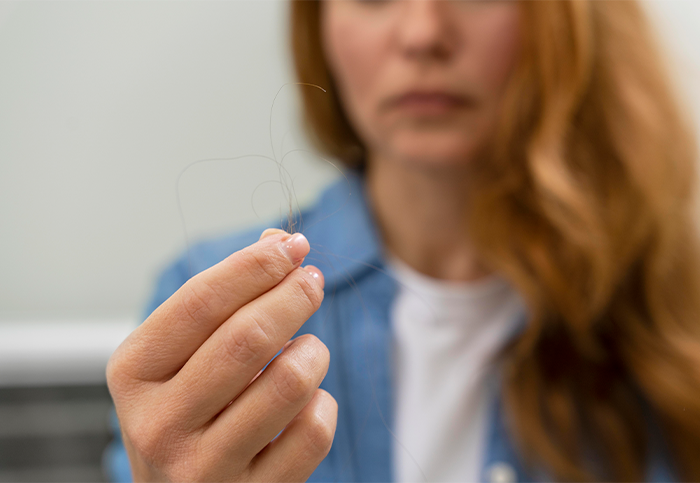PCOS and Mental Health: Why PCOS Might Take an Emotional Toll on You
Recent research from the University of Alabama highlights a significant concern: women with PCOS face a markedly higher risk of mental health challenges. According to their findings, those with PCOS are 77% more likely to experience anxiety, 53% more likely to develop eating disorders, and more than twice as likely to suffer from depression compared to their peers without the condition.
These statistics underscore the severe impact of this condition on mental health and its ill effect on the overall well-being of women. PCOS is often loud and blaring with symptoms like pimples, hirsutism, and many other issues. What often goes unnoticed are the small, lesser-known impacts of this disease. Depression, anxiety, and emotional distress are just a few among the many.
Why Might Your Mental Health Take a Hit with This Condition?
The problem boils down to neurotransmitters. These are chemicals produced in the body to carry messages across. Among these, serotonin- often referred to as the "happy hormone"- plays a crucial role. In people with PCOS, serotonin and other neurotransmitters are usually produced in lower amounts, making them more susceptible to depressive episodes and unsettling anxiety.
Impacts
Stress, Anxiety, and Depression
Stress, anxiety, and depression have substantial effects on the lives of individuals suffering from PCOS. Persistent worries, a sense of impending doom, and an inability to find joy in daily activities are common among women with PCOS. These feelings can lead to cognitive impairments, such as difficulty concentrating, making decisions, or remembering tasks. Routine activities can feel mentally exhausting. Social interactions and self-care may suffer, leaving individuals feeling isolated, disconnected, and unable to manage their responsibilities effectively, which adds to their sense of frustration and helplessness. In all this chaos, the skin also began reacting which makes all women suffering from PCOS go “I care but my skin doesn’t care.”

Eating Disorders
PCOS is often linked with eating disorders. Women with PCOS frequently experience concerns about body shape and weight, which can lead to disordered eating behaviors such as starving, binge eating, and purging. These behaviors are often accompanied by unhealthy exercise patterns like over-exercising. These disorders are particularly prevalent during the teenage years when young women are acutely aware of their physical appearance and may feel their PCOS-affected bodies are out of control. The hormonal fluctuations of adolescence, combined with PCOS, can worsen mood and behavioral issues.
The relationship between PCOS and eating disorders can be bidirectional. Poor eating habits can disrupt hormonal balance, leading to further complications associated with PCOS. Thus, addressing eating behaviors is crucial in managing both PCOS and its related symptoms.

What Can Be Done About It?
While mental health issues are complex to deal with, but a lot can be done to initiate the healing journey. These steps are often considered less significant but have a great impact in the long run.
1. Find Purpose and Meaning in Life
Finding purpose and meaning in life is one of the biggest existential questions in the history of mankind. Having a purpose and outlook in life gives us the drive needed to go about our lives. Occasionally, getting lost and the inability to find your purpose can lead to stress, anxiety, and depression. Therefore, constantly look for activities that can bring meaning to your life, even if you don’t get paid for them. These can be activities that bring out your creativity such as gardening, writing, painting, banking, etc.
2. Have A Positive Outlook On Life
An optimist always sees the glass as half full, while a pessimist sees it as half empty. The perspective with which an individual views a situation makes an immense difference. It takes a huge amount of struggle to maintain a positive attitude while viewing things and life situations. One way to bring a positive outlook to your life is to practice gratitude. Be thankful for the smallest things in life.
3. Give Importance to Self-Care
Self-care doesn’t mean expensive spa visits or fancy holidays. It simply means doing anything with the sole purpose of bringing happiness to you. It can be something as simple as taking a walk in nature or journaling. Taking time out for yourself can make a huge difference!

4. Prioritize Your Social Life
Humans, being social creatures, derive their happiness from relationships and kinships. Working on social relations can promote emotional welfare and can alleviate many mental health-related worries. Start by letting go of grudges you have held for too long! or call a long-lost friend that you haven’t talked to in ages.
5. Consult A Psychologist and Seek Help
If none of the suggestions work and things go awry, then getting professional help can be your best bet. Psychologists are trained professionals who can provide you with the right tools and aids needed to manage your condition. It may take a while and more than one visit to the psychologist before you begin seeing the results.
Healing Journey with Nutrifactor Supplements
While the above-mentioned suggestions can help a great deal, more effective results can be obtained if the issue is nipped in the bud. The real results come when PCOS is treated first. PCOS management is not a sprint but a marathon, requiring consistent changes in habits and lifestyle. Nutrifactor offers products that may support your healing journey. With supplements like OXITOL, which provides hormonal and ovarian support, and NUCEPTION, which aids in reproductive health, Nutrifactor can help make your journey toward better health smoother and more effective.
References
https://www.researchgate.net/publication/372889304_Direct_economic_burden_of_mental_health_disorders_associated_with_Polycystic_ovary_syndrome_systematic_review_and_meta-analysis
https://www.frontiersin.org/journals/public-health/articles/10.3389/fpubh.2022.958884/full
https://pubmed.ncbi.nlm.nih.gov/38155280/
https://www.nih.gov/health-information/emotional-wellness-toolkit
https://www.nimh.nih.gov/health/topics/caring-for-your-mental-health
https://www.sciencedirect.com/science/article/abs/pii/S0091305701006700



